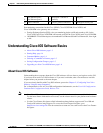
CHAPTER
1-1
Cisco VG202, Cisco VG202XM, Cisco VG204, and Cisco VG204XM Voice Gateways Software Configuration Guide
OL-16191-01
1
Understanding Interface Numbering and
Cisco IOS Software Basics
• About the Voice Gateways, page 1-1
• Port Numbering Conventions, page 1-1
• Understanding Cisco IOS Software Basics, page 1-3
• Typical Voice Gateway Deployment Scenario, page 1-6
• Where to Go Next, page 1-6
About the Voice Gateways
Cisco VG202, Cisco VG202XM, Cisco VG204, and Cisco VG204XM voice gateways deliver analog
voice gateways for the service provider as well as commercial and enterprise unified communication
markets. These voice gateways provide voice connectivity to devices such as analog phones, fax
machines, and modems.
Cisco VG202, Cisco VG202XM, Cisco VG204, and Cisco VG204XM voice gateways provide support
for 2-FXS (Cisco VG202 and Cisco VG202XM) and 4-FXS (Cisco VG204 and Cisco VG204XM) ports,
each supporting independent telephone numbers giving you two or four separate lines, and parity with
Cisco IOS fax/modem, security, and Session Initiation Protocol (SIP) features. Both voice gateways are
configurable with Cisco Unified Communications Manager (CUCM) & Cisco Unified Communications
Manager Express (CUCME).
Note Cisco VG202, Cisco VG202XM, Cisco VG204, and Cisco VG204XM voice gateways are fixed voice
gateways and do not support interface cards.
Port Numbering Conventions
The Cisco VG202 voice gateway supports two RJ-11 ports and supports two FXS voice ports with two
10/100 Fast Ethernet ports. Figure 1-1 shows the interfaces and ports on the Cisco VG202 voice gateway.
All interface ports are on the back of the chassis.


















